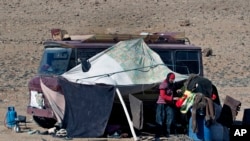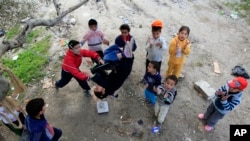From VOA Learning English, this is As It Is.
Welcome back. I’m Caty Weaver. On the program today we explore the situation of almost one million Syrian refugees currently living in Lebanon. More and more flee across the border every day. The United Nations is concerned about the limited food aid it can provide the refugees. And it says most refugee children are receiving little or no education.
The Syrian refugee crisis in Lebanon: today on As It Is.
Many Syrian Refugees in Lebanon Lose Food Aid
United Nations agencies have been forced to reduce food aid to about one out of five Syrian refugees in Lebanon. Those who get no food say they are falling into deep debt. VOA reporter Jamie Detmer investigated the situation from Beirut. Christopher Cruise has his report.
Syrian refugees continue to flee the violence in their country. Many of them are going to Lebanon. U.N. aid agencies found it increasingly difficult to provide food assistance to them for most of last year. Twenty percent of registered refugees had their food aid ended at the end of 2013.
Um-Odai fled the Syrian city of Homs with her husband and five children. They are living in a shelter in the northern Lebanese city of Tripoli.
She says her family stopped receiving assistance, and now, they owe a lot of money. Her husband is too sick to look for work. Four of her children are very young. Her oldest son has a wife and a newborn.
She says one of her sons works as a laborer on jobs that sometimes last for just one day. When he finds a job he can bring money to the family. But Um-Odai says the family owes money to many shops in the area. They do not know how they will pay their debt.
She says they owe $2,000 after living in Lebanon for a year-and-half.
About eleven thousand Syrian refugees arrive in Lebanon every week. Negotiators have made little progress in reaching an agreement to end the civil war in Syria. The flow of Syrian refugees to Lebanon shows no sign of slowing. A million Syrians will have registered as refugees in Lebanon by the beginning of March if new arrivals continue at the current rate.
Ninette Kelley is the head of the U.N. refugee agency in Lebanon. She says the U.N. does not have enough food for all of the refugees, so it helps those most at risk.
“Most of last year, blanket food assistance was provided to everybody who was registered, but this is not something that is a normal practice. But once you have more information you can further target your provision of food assistance according to vulnerability.”
Last year, U.N. agencies worked to establish who were the most at risk among all registered Syrian refugees. The agencies found 80 percent of the refugees would have no other form of food support without international assistance. The agencies used this information to make some difficult decisions.
“Which meant that there were 20 percent who had been receiving food who were notified that they would no longer receive it on a regular basis.”
But Um-Odai says she does not understand why she and her family are among about 250,000 refugees without food assistance. She says the decision does not seem reasonable. She says she and her husband know other refugees in the camp who are in the same situation as they are. But, she says, those refugees are still receiving U.N. money to buy food and her family is not.
Even those who receive U.N. food aid say life is getting harder and more costly. They say they, too, are creating debt.
I’m Christopher Cruise.
United Nations officials say one-third of the Syrian refugees fleeing to Lebanon are school-age children. But the majority of them are not able to go to school. We return to Caty Weaver, who has more on the situation of these young refugees.
Many Syrian Refugee Children Not Attending School
Eleven-year-old Marah has been in Lebanon for eighteen months. She lives in an unofficial refugee settlement near the coastal Lebanese city of Tripoli. Her family had lived on a farm near the Syrian city of Homs. They fled when a rocket hit their farmhouse during an attack.
Marah is luckier than most of the refugee children in Lebanon: she is attending school.
Marah says it is difficult for her to learn in Lebanon’s French-based educational program. In Syria, she was taught in Arabic. She says she speaks Lebanese to understand the other students. But there are problems. She says they sometimes insult her and other Syrian students for being refugees.
But Marah at least has a chance of reaching her goal to become a nurse. In her settlement there are about 200 families. Only a few of them have children in school.
Media reports about the refugees are mostly about their emergency needs -- like food and medical care. Those needs take most of the humanitarian aid as well. But the longer-term needs of the refugees are becoming more central as the Syrian civil war continues.
The lack of educational possibilities for refugee children is a major concern for Ninette Kelley.
“The situation of children is rather dire. There are over 300,000 now, Syrian school-age children, which is the same number of Lebanese children who were registered at Lebanese schools last year. And while the ministry of education has indicated they could absorb 100,000 in the formal education system that still leaves over 200,000 kids without a formal education option.”
The U.N. and non-governmental groups are working together to try to provide basic reading and writing classes for children. They are centering efforts on the temporary refugee settlements that are being created. The Lebanese government has refused permission for the building of official refugee camps.
But, Ms. Kelley says basic reading and writing classes are not going to meet the needs of older children in the camps.
And that’s As It Is for today. I’m Caty Weaver. Thanks for joining us.
We are sorry, but this feature is currently not available






